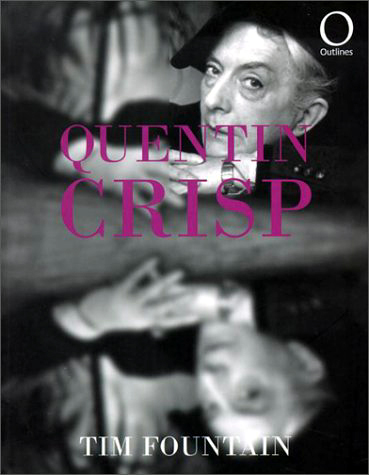|
|
|
 |
THE QUENTIN CRISP ARCHIVES
|
TIM FOUNTAIN Playwright, Resident Alien Author, Outlines: Quentin Crisp |
||
|
A desperate dandy's final death riddle:
Unraveling the story behind Quentin Crisp's last tragic days |
||
|
One hundred years since Quentin Crisp's birth, John Hurt will reprise his award-winning role as the flamboyant writer and actor, in ITV1's film, An Englishman In New York, based on the late Crisp's outrageous diaries. A play about Crisp, Resident Alien, opens in London next week. Here, its author, TIM FOUNTAIN, explores the contradictions that surrounded Crisp...
 A frail, 90-year old Quentin Crisp clung on to his travelling companion. He was about to board a gruelling economy class flight from New York to Britain. It was a flight his closest friends and advisers had begged him not to make, convinced he would not survive it. A frail, 90-year old Quentin Crisp clung on to his travelling companion. He was about to board a gruelling economy class flight from New York to Britain. It was a flight his closest friends and advisers had begged him not to make, convinced he would not survive it.Just 16 hours later he would be found dead in a Manchester boarding house. So what drove the self-styled 'stately homo' — a man who claimed to hate England — to return home when he knew it may kill him? Did he effectively commit suicide? I believe he did. Crisp, who died in 1999, was born 100 year ago. To mark this anniversary my play about him, Resident Alien, is being revived next week. As well as this, An Englishman In New York is the highlight of ITV's spring schedule, with John Hurt reprising his role as Crisp, 34 years after we last saw him in The Naked Civil Servant. The new film, which takes its title from Sting's 1987 song about Crisp, tells the story of what happened after he emigrated to New York in 1981. There he flourished, becoming a favourite of the arty set, friends with Andy Warhol, eccentric film stars, and fans including President Carter. Yet, he was still living in squalor in a tiny one-room apartment in Manhattan's Lower East Side. The sequel to the first film, which depicted his struggles growing up homosexual in defiance of the rigid mores and prejudice of post-war Britain, tells how, instead of being forced into the shadows by intolerance as he was in London, he was embraced by his adopted city. Crisp himself said: 'In England no one is your friend, in America people will tell you the story of their lives while waiting for the traffic lights to change...' Once asked if he missed anything about England, he replied: 'My gas fire, that's all, England was a terrible place.' John Hurt as Quentin Crisp in ITV's new drama The film's take on it all is being kept under wraps. Does it reveal why the flamboyantly gay Crisp declared that homosexuality was a 'curse' that 'he wouldn't wish on his worst enemy'? Or the truth about the mysterious circumstances surrounding his death which, I believe, I have uncovered? Days before he died in November 1999, my play about him had just reached the London stage. Despite initially giving me his blessing, Crisp had started to say he wasn't happy about it, fearing we were going to destroy his image. Then, he arranged a series of performances of his own show, An Evening With Quentin Crisp, determined to tour the country. No one thought he was well enough to make the journey to the UK or give the performances. He had an enlarged heart, a 'hernia as big as an orange' and chronic eczema. On the plane over he drank heavily, and according to the landlady of the guest house where he stayed, he continued to do so when he arrived. The next morning she found him dead, surrounded by his angina tablets and an empty brandy bottle. The Manchester coroner's report put his death down to a heart attack. Why did he put himself through this? I believe the answer lies in something he told me just a few weeks earlier. He said: 'I want to die a significant death, I don't want a lot of people to be stood round my bed saying: "Isn't he dead yet, I thought he'd died years ago."' Crisp had a lifelong addiction to publicity. He would be outrageous just to get noticed. I am not alone in thinking he may have planned the whole thing. His personal assistant and the executor of his will, Phillip Ward, believes that Crisp knew there was a possibility he would not return to the U.S. and that he wanted to go to Britain and perform 'a deliberate dance with death'. Revealingly, just six days before he left for Britain, Crisp redrew his will. Ward says that once he had signed it he turned to him and said: 'Good, I can die now.' In the final days before he left New York, his close friend Penny Arcade (played in ITV's new film by Sex And The City's Cynthia Nixon), pleaded with him not to make the journey. Crisp replied: 'But if I die in America in my sleep, I'll only make page ten.' By dying in the country he'd professed to hate, on the eve of his farewell tour and with a play about him on in London, he made certain his death became front-page news. The tributes focused on his eccentric lifestyle — and how he lived in poverty in his filthy one-room flat. The press, like everyone else, presumed he had died penniless. But when Crisp's will was published the 'impoverished' icon, whom artists in the bohemian East Village of New York had arranged benefit performances for — had left almost £500,000. A bank account in Britain contained more than £50,000 — his British old age pension. His U.S. account contained tens-of-thousands of dollars he'd received from the U.S. social security system alongside fees for TV adverts and films. But his will wasn't the only shock revelation. Despite always maintaining he 'didn't know what love meant', that there was no one he was close to and that he preferred the company of strangers, he had a secret family both in Britain and the U.S. He left the bulk of his fortune to them, more than £100,000 each. Quentin's funeral was held at the faceless South Manchester Crematorium. Just eight people attended. He always said he wanted no fuss, but he would have been amused that the DSS paid it for. They, too, presumed Crisp had died penniless. He went to his maker under three names. His real name Denis Pratt, his assumed name Quentin Crisp, and the name the tour promoter had given him to keep the press away, Bernard Smith. But this wasn't the only bizarre detail to emerge from the final days of Crisp's life. The policeman who arrived at the guesthouse to identify Crisp's body was called PC Sissy. The undertakers who came to remove the body were themselves gay and became so excited to see their hero that they almost dropped his body. It was a joke Crisp would have relished. In another macabre twist his ashes were flown back to New York with his travelling companion and the two of them were given an upgrade to first class. On the journey here he had travelled economy, but in death was Crisp afforded first class status. In death as in life, Quentin Crisp had the last laugh. • Resident Alien, starring Bette Bourne, is at The New End Theatre, London, from January 28 to April 5, 2009. Tickets: 0870 033 2733. Click here to read the article at the Daily Mail, published on January 22, 2009. |
||
Book cover photograph copyright © by Marjori. Used by permission. All rights reserved.
Photographs copyright © by Murdo MacLeod and Kalpesh Lathigra. All rights reserved.
All text and photographs used without permission.

Site originally designed by:

Luczak photo by Lou Miranda.

Site Copyright © 1999–2015 by the Quentin Crisp Archives.
All rights reserved.

